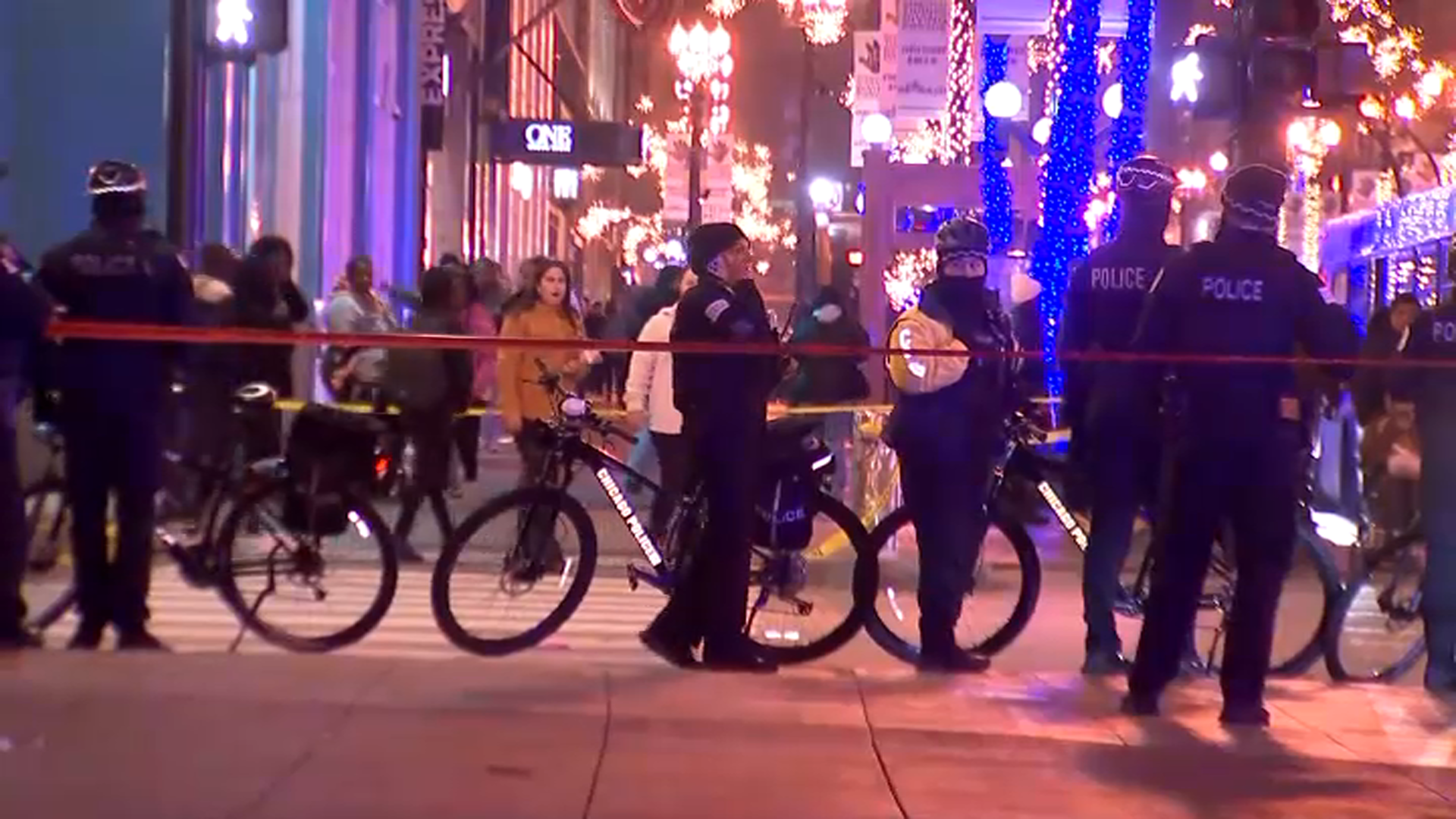Chicago is expected to soon enter a "high" alert level under guidelines set by the Centers for Disease Control and Prevention, but what will that mean heading into Memorial Day weekend?
The rising metrics and alert level come as there's a new dominant strain in the U.S., according to CDC estimates.
Here's what you need to know about the coronavirus pandemic across Illinois today:
Chicago Would Not Immediately Reinstate Mask Mandate Should Region Move Into ‘High' COVID Risk, Officials Say
Though Cook County could move into a level of high COVID-19 transmission by the end of the week, Chicago health officials say a mask mandate would not immediately return.
The Chicago Department of Public Health said the additional mandates wouldn't be reinstated because severe outcomes of a coronavirus infection are "relatively rare" and the burden on hospitals remains "low."
Read more here.
Local
What Happens Once a County Reaches ‘High' COVID Alert Level?
As more Illinois counties reach heightened community COVID-19 levels, what could happen once an area is put on "high" alert?
Feeling out of the loop? We'll catch you up on the Chicago news you need to know. Sign up for the weekly Chicago Catch-Up newsletter.
In the event that a county reaches a “high community level” of COVID, residents are advised to wear masks indoors regardless of coronavirus vaccination status, according to the Centers for Disease Control and Prevention.
Read more here.
New Omicron Subvariant Now Dominant Strain of COVID-19 in United States: CDC Estimates
A new subvariant of omicron is now the dominant strain of COVID-19 in the United States, according to the latest estimates from the Centers for Disease Control and Prevention.
According to that data, the BA.2.12.1 subvariant, one of several variants of omicron that are driving an increase in COVID infections in the United States in recent weeks, is now responsible for nearly 58% of new cases over the last week.
Read more here.
Chicago Likely to Reach ‘High' Alert Level As Early As Friday, Top Doc Says
As COVID cases continue to climb across much of the U.S. and Illinois, Chicago's top doctor said the city could reach a "high" alert level by the end of the week.
"I do anticipate that Cook County, which includes Chicago, will move to high with the update [from the Centers for Disease Control and Prevention] later this week," Chicago Department of Public Health Commissioner Dr. Allison Arwady said in a Facebook Live Tuesday. "And so I would expect by Friday will probably be there."
Read more here.
Most COVID Long-Haulers Experience Neurologic Symptoms, Compromised Quality of Life Long After Infection, New Study Says
A new study from Northwestern Medicine shows that many so-called COVID "long-haulers" continue to experience symptoms including brain fog, tingling, headaches, dizziness, blurred vision, tinnitus and fatigue an average of 15 months after the onset of the virus, a press release on Tuesday said.
"Long-haulers,” are defined as individuals who have had COVID symptoms for six or more weeks, the hospital system has said.
According to Igor Koralnik, MD, chief of Neuro-infectious Diseases and Global Neurology at Northwestern Medicine, "The study reports the longest follow-up period of neurologic symptoms impacting non-hospitalized patients suffering from long-COVID anywhere in the world."
Read more here.
New Omicron Subvariant: Symptoms, How Fast It's Spreading, and More
The Centers for Disease Control and Prevention updates its estimates on which subvariants are causing cases of coronavirus in the United States each week, and a new version of omicron could ascend to the top of that list this week.
According to last week’s data, the BA.2.12.1 subvariant of omicron made up an estimated 47.5% of COVID cases in the United States.
So what exactly is this new subvariant? Is it spreading faster than previous iterations of the virus? And does it cause more severe illness? Here’s what we know so far.
How Many Children Are Vaccinated for COVID in Illinois? Here's the Data
As booster shots for children are authorized by the U.S. Food and Drug Administration with COVID cases rising across the country and state of Illinois, how many children are already vaccinated against the virus?
The Illinois Department of Public Health has been tracking metrics across the state.
As of Friday, data showed over 60% of Illinois children between the ages of 12 and 17 are fully vaccinated, while just 36% of those between the ages of 5 and 11 have completed a series.
See a full county-by-county breakdown for the Chicago area.
Illinois to End Contact Tracing Calls for COVID Patients, Will Send Text Messages Instead
The Illinois Department of Public Health says that it will no longer conduct contact tracing via phone calls to individuals who test positive for COVID-19, and will instead use automated case notifications via SMS text message starting next month.
Beginning on June 1, IDPH officials say that they will no longer make case investigation phone calls to individuals who test positive for COVID-19, and that the contact tracing call center that had been established during the pandemic will cease operations.
Read more here.
Illinois COVID Stats: Slight Drops in Metrics After Periods of Increases
One week after Illinois experienced an average of more than 6,000 COVID-19 cases for the first time in three months, the state has seen a break in the upward trend - as both slight decreases in case numbers and hospitalizations have been reported.
However, metrics still remain substantially higher than they were a few months ago, according to newly-released data from the Illinois Department of Public Health.
Read more here.
COVID Test Kit from USPS: How to Get Yours in the Mail
You can now sign up to receive 8 free, at-home rapid antigen COVID tests in the mail, the federal government recently announced.
In previous rounds of test distributions residents could only claim up to four at-home COVID test kits per household.
Test kits will be shipped for free to residences, according to the United States Postal Service. Those tests will come in two separate packages, with four test kits in each package, the USPS says.
Here's how to sign up and get yours mailed to your home.
Illinois COVID Testing: Where to Find Free Rapid, PCR COVID Tests Near You
COVID cases and hospitalizations are continuing to climb in Illinois, with the state now averaging more than 6,000 new probable and confirmed COVID-19 cases per day.
It's the first time in more than three months Illinois has seen the daily rate that high.
The good news is, COVID testing across Chicago and at Illinois remains free at many sites. And, the federal government is now offering residents double the number of free COVID rapid antigen tests during its newest round of kit availability, according to an update by the United States Postal Service.
If you're experiencing symptoms, or you believe you've been exposed, here's where you can find free COVID testing near you in Chicago and Illinois, for adults and kids.
How Long Can You Test Positive for COVID Following Infection?
If you test positive for COVID, how long could that last?
According to the Centers for Disease Control and Prevention, some people who contract COVID-19 can have detectable virus for up to three months, but that doesn't mean they are contagious.
When it comes to testing, however, the PCR tests are more likely to continue picking up the virus following infection.
Read more here.
When Are You Contagious With COVID and How Long Should You Quarantine?
COVID-19 cases have been on the rise across Chicago and the city's top doctor said the trend will likely continue in coming weeks, sparking questions from concerned residents.
Dr. Allison Arwady, commissioner of the Chicago Department of Public Health, says that the city's positivity rate has soared to nearly 5% in recent weeks, and she expects metrics to continue to rise in the coming days.
Read more here.
Low, Medium, High: What CDC's Community Levels Mean and What's Required in Each
With nearly every Chicago-area county having reached the "medium community level" for COVID-19 and one Chicago suburb reaching "high" transmission levels, per guidance set by the U.S. Centers for Disease Control and Prevention, what does that mean for you?
So what does that mean and what does it take to reach each level?
Here's a look at the guidelines.
Tested Positive for COVID and Looking for Treatment Options? Here's What to Know About Pfizer's Antiviral Pill
As more test positive for the coronavirus across the Chicago area, many are turning to questions over treating the virus with the new antiviral COVID-19 pill.
Pfizer's Paxlovid pill has been used in several recent high-profile cases, including Vice President Kamala Harris.
But as more doctors prescribe Pfizer's powerful COVID pill, new questions are emerging about its performance, including why a small number of patients appear to relapse after taking the drug.
COVID Incubation Period: How Long Should You Quarantine and When Are You Contagious?
COVID-19 cases have been on the rise across Chicago and the city's top doctor said the trend will likely continue in coming weeks, sparking questions from concerned residents.
Dr. Allison Arwady, commissioner of the Chicago Department of Public Health, says that the city's positivity rate has soared to nearly 5% in recent weeks, and she expects metrics to continue to rise in the coming days.
"In this wave...it's likely that we'll have even more cases before we see it turn around," she said. "And the last thing we want to do is to have people really see the hospitalization numbers going up significantly."
For those who contract COVID, there may be lingering questions. Here's the latest information from the Centers for Disease Control and Prevention.
CDC COVID Guidelines 2022: Symptoms to Watch for, How Long to Quarantine and More
With new, more contagious variants of COVID-19 spreading across the U.S. and nearly all of the Chicago area rising to a higher alert level, many are wondering what to do if they experience symptoms or test positive for the virus.
If you were exposed, when could symptoms start, how long are you contagious, how long should you quarantine for and when is the best time test?
Read more here.



